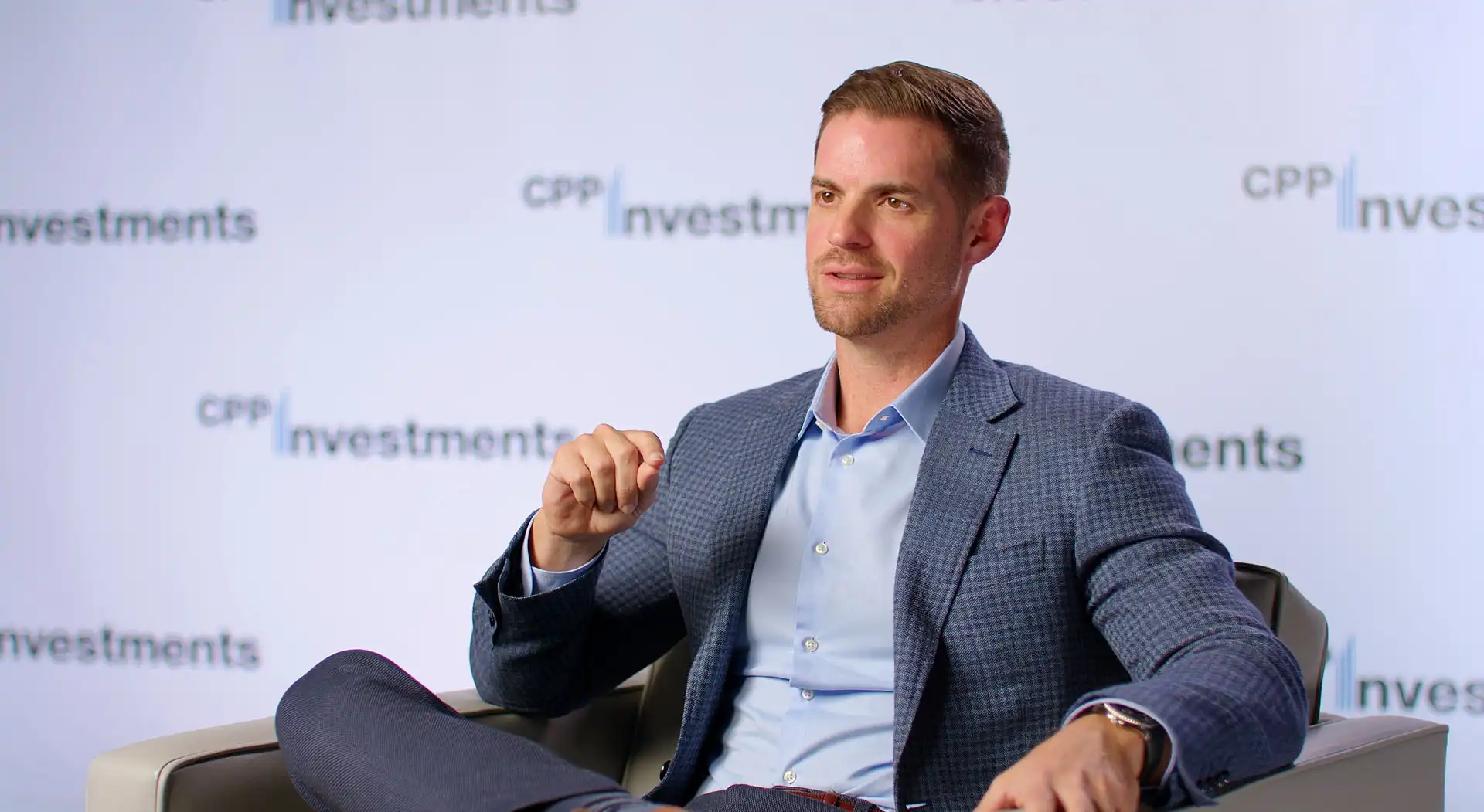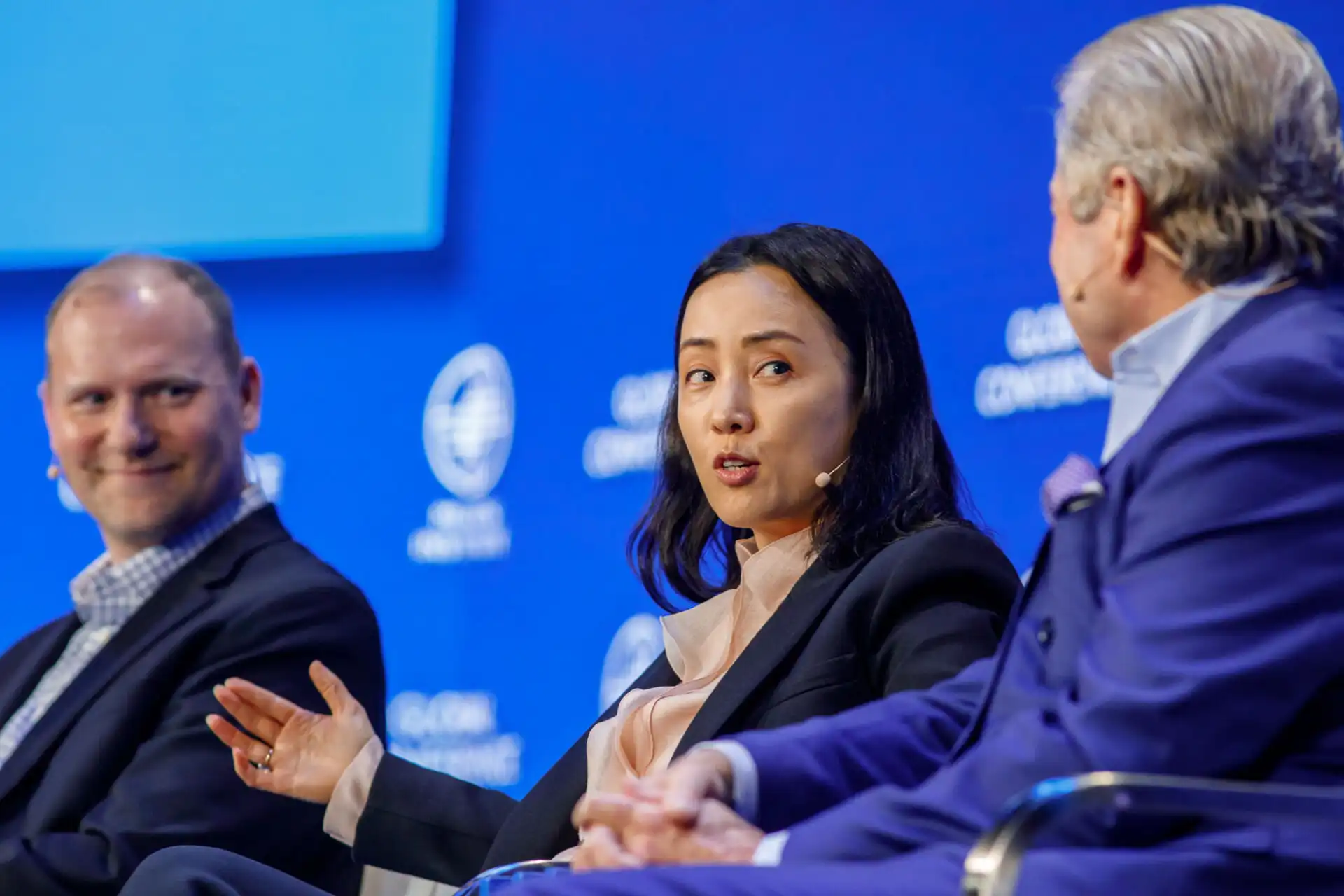This Q&A was first published by iConnections, what follows are insights from CPP Investments leaders on private equity, venture capital, and the value of gender equity. You can learn more about iConnections and view the full report here.
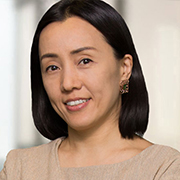 Suyi Kim, Senior Managing Director and Global Head of Private Equity
Suyi Kim, Senior Managing Director and Global Head of Private Equity
Question: With 2023 shaping up to be a volatile but interesting year, what are your perspectives for capital allocations and the overall valuation landscape, particularly within private markets?
Answer: Private markets are a significant and important part of the CPP Investments portfolio – we remain positive but do expect continued turbulence in markets during 2023. Market volatility presents good opportunities for long-term investors like us, and we believe active management and diversification allow us to outperform the market and regularly strengthen the resilience of our portfolio. As a patient, active investor, we are focused on identifying investment opportunities with the right profile that will succeed in this uncertain environment.
During these uncertain times, what risks do you need to be most mindful of? And what skills or experiences are you able to draw upon that you’ve learnt from earlier in your career?
Whether it’s private markets or public markets, the macro uncertainties have made it much harder to forecast or predict investment outcomes – diversification is one of the most important ways we manage risk in the portfolio. Having been in private equity markets for over 20 years, there have been numerous “uncertain times,” but each one is unique based on differing macro environments. In managing these risks and making judgment calls, it is important to not solely anchor on past experiences.
There have been numerous “uncertain times,” but each one is unique based on differing macro environments. In managing these risks and making judgment calls, it is important to not solely anchor on past experiences.
Further, during each period of uncertainty, sectors and geographies will be impacted differently and identifying these circumstances and factoring these insights into valuation assessments is a skill. When I started in private equity, there were few guidelines for evaluating and analyzing companies; we now have pretty good metrics and methodologies, but there’s a wide range to these, so the judgements we apply remain critical to decision making. Experience and judgement are critical during uncertain times. My pre-private equity career included auditing to complete my CPA qualification, where I learned how to decipher financial statements, to strategy consulting over the Asian crisis; the skillset and experience I learned early in my career continues to be very valuable.
Do you have any specific thoughts regarding gender equity and future opportunities for female investors?
The private equity industry has been behind the public markets in managing the gender imbalance. Approximately 20% of investment professionals in private equity are women; at the Managing Director level that falls to 10%; then within Investment Committees that falls into the single digits. It’s important to understand how gender balance is prioritized and where the importance is placed, as well as how this is formalized and executed. The future opportunities to provide avenues for women and create gender equity are very dependent on this – without it being prioritized, opportunities will not be made available. Internally, like other organizations, we have well-established programs focused on topics such as overcoming biases, along with specific career development efforts for junior talent.
How does CPP Investments work with the industry to seek to enhance gender equity? And as you have built out your team, how have you sought to inspire and mentor your female colleagues?
Now these percentages are going up, and we have a good pipeline of junior professionals, this is inspiring. At CPP Investments, we believe that diversity supports better performance outcomes. We are responsible for developing and nurturing talent into the senior ranks – a critical focus for me as a leader and for us as a Fund – and 46% of our workforce are female. Beyond our own talent, we continue to work with our external partners and portfolio companies to help them better understand why this is important. Hopefully, five or 10 years down the road, the gender balance will be more equal.
At CPP Investments, we believe that diversity supports better performance outcomes. We are responsible for developing and nurturing talent into the senior ranks
Sponsorship and mentorship are important, both formal and informal. Having held a senior role for a long time and working with colleagues in different markets, I’ve seen how important it is to adapt and flex one’s approach in terms of mentorship and apprenticeship.
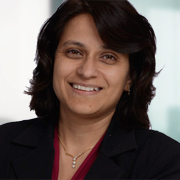 Priti Singh, Senior Managing Director and Global Head of Capital Markets and Factor Investing
Priti Singh, Senior Managing Director and Global Head of Capital Markets and Factor Investing
You hold a significant role at CPP Investments, chairing the internal initiative focused on embedding equity, diversity and inclusion – what are the key focus areas for the group? And specifically on ensuring greater gender equity?
Our internal initiative, the Inclusion & Diversity Leadership Council, has been running for several years; its objective is to employ inclusive practices for all colleagues with the goal of driving better business decisions and increasing representation of historically underrepresented groups. The Council, alongside Karen Sihra, Managing Director, Equity, Diversity & Inclusion, works hard to identify where we are failing and where enhancements are required. As a truly global organization, the diversity of our people is an important asset; this in turn is key to ensuring diversity of experiences and thought, which leads to better decision making.
As a truly global organization, the diversity of our people is an important asset; this in turn is key to ensuring diversity of experiences and thought, which leads to better decision making.
Practically, the focus is on: ensuring that our culture maintains this initiative, formalizing internal programs and training programs, and regularly analyzing the data to monitor our progress. Our talent – new hires and existing talent – are critical to the success of the fund. Supporting our talent, our future leaders, and focusing on the diversity of experience and thought is critical.
Where do you believe the industry can push and work harder, in order to be more welcoming to female investors?
To achieve full equity and inclusivity we must focus on where there can be benefits for everyone – by being too focused we can risk exclusivity or bias. Practically, this can be achieved through building a culture that allows for psychological safe spaces; this ensures everyone can add value and be their strongest self. An approach that ultimately builds a culture of inclusivity drives a culture that is welcoming to female investors. We have been focused on building this culture for some time, and data via internal surveys we have carried out at CPP Investments confirms that over 70% of our colleagues feel encouraged to “call out” bias when they witness it.
And more generally, what are your top recommendations to individuals who are now establishing themselves in the industry?
First and foremost, have a passion to learn – this is an industry where the pace of change has accelerated massively, and we’re always working hard to keep up and stay ahead of this change! I believe that a desire for continuous learning is a key component for success.
Secondly, be ready to pace yourself – this is a marathon not a sprint, and the industry supports those that are patient. There has been a lot of focus on burnout in the last couple of years, and hard work in this industry does not come from working at a pace that can risk burnout.
These are two recommendations that continue to stand the test of time as advice for anyone, whether you are new to the industry or have been here a long term.
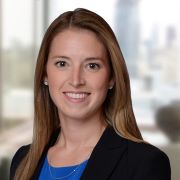 Caitlin Gubbels, Managing Director, Head of Private Equity Funds
Caitlin Gubbels, Managing Director, Head of Private Equity Funds
Despite the challenges that 2023 is presenting, looking ahead which themes do you believe offer the most compelling long-term returns for investors?
Our private equity funds portfolio has a reasonably high level of technology exposure, and this has been a key contributor to strong returns over the last five and 10-year periods. Despite the recent correction in tech valuations, we still have positive conviction in the sector and the tailwinds supporting further growth and returns. While private investing in technology has come a long way, we expect to see ongoing evolution, including the importance of data as a driver of the value creation thesis.
While private investing in technology has come a long way, we expect to see ongoing evolution, including the importance of data as a driver of the value creation thesis.
Our private equity funds strategy does not have fixed sector or geographical weightings. We believe in a bottom-up approach to manager selection to maximize our net returns and drive partnership opportunities. As we look ahead, we are focused on identifying and committing capital to partners who are best positioned and well-experienced in navigating periods of uncertainty and have a proven track-record during what is ultimately a more attractive valuation environment.
With regards to GPs and underlying assets – what progress are you seeing towards greater gender equity?
With more females on boards and holding C-suite level positions within portfolio companies, the progress is evident but there is certainly more to be done. Within private equity funds, female talent at the senior level has been slower to materialize. As the industry is now focused on more balanced recruitment efforts, and retaining top female talent throughout their careers, I am hopeful and expect we will see a very different gender composition 10-years from now.
As a senior executive, how do you share what you’ve learnt through your career to support female colleagues in your team, as well as in your wider investment interactions with GPs and portfolio companies?
During my 13 years at CPP Investments, I have benefitted from the mentorship of many senior leaders. Now, as a leader within our private equity business, I am focused on passing on the mentorship that was provided to me, including during three of my maternity leaves. I believe strongly that sharing personal experiences helps to drive empathy and can help to reduce the incidences of women self-selecting out of the asset class. My advice to our private equity partners, GPs and portfolio companies is to approach the topic as a conversation and most importantly to listen. Many people are well-intentioned on this topic, but perhaps rush to conclusions or try to apply a ‘one size fits all’ approach. My personal belief for talent management is to act with flexibility and empathy, and this will drive long-term results.
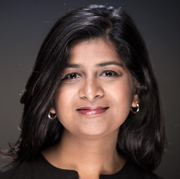 Monica Adractas, Managing Director, Growth Equity
Monica Adractas, Managing Director, Growth Equity
The venture capital space experienced significant changes, particularly in valuations, last year – how have you navigated the investment landscape? Has CPP Investments adapted its strategy or approach to VC and growth equity fund investing?
With the change in macro conditions, the adjustments to private equity and VC are increasingly present. Regarding fund investments, our strategy remains consistent and is largely unchanged – our focus is always on the long-term. We continue to look for great partners, and especially those that demonstrate an ability to learn and adapt to a changing world.
The evidence suggests that female founders are finding success in the VC space. Do you agree with this evidence and are you encouraged by the industry’s support to female founders?
The VC industry has worked hard to improve gender equity – there is a strong emphasis on the cultivation and support of female and other diverse talent. Progress is happening, albeit slowly; approximately 3% of VC investments are allocated to female-led businesses. This stands out as an outlier given females make up 50% of the world’s population and this balance should be improved. On the VC investor side, there’s a strong commitment to supporting female talent – within the industry globally, approximately 15% of senior investors are women, with females approximately 45% of the overall VC workforce. Given the apprenticeship and long-term nature of investments in the space, we recognize it may take time to see significant improvement.
The VC industry has worked hard to improve gender equity – there is a strong emphasis on the cultivation and support of female and other diverse talent.
For 2023, what themes and trends within the VC space are you and your team prioritizing in 2023?
Our strategy is to invest across all sectors, and we often make direct investments alongside our partners. Regarding themes and trends, we spend significant time evaluating opportunities across enterprise software, fintech, healthcare and climate change. We believe these sectors are experiencing long-term, generational shifts and offer good potential for value creation.
With regards to career progression, how would you describe your experiences within growth equity to-date? And what does future success mean to you?
I have been a full-time investor at CPP Investments for four years and prior to joining the fund I worked in Silicon Valley as a technology operating executive. My last role in Silicon Valley was at Meta, where I co-founded a new business area. I continually see the benefit of thought diversity – both through my broad background and experiences and as a female executive. This diversity helps create unique perspectives, which are essential for analysis and decision making. Several studies have shown that diverse teams outperform. At CPP Investments, we are working towards greater diversity and inclusion, while also solving for the best results through our partners.
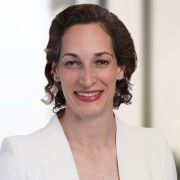 Amy Flikerski, Managing Director, Head of External Portfolio Management
Amy Flikerski, Managing Director, Head of External Portfolio Management
It’s been quite a year for public markets. What would your scorecard assessment be in terms of how your external managers have navigated what has, at times, been pronounced periods of volatility?
Our external public markets program, which invests in hedge funds and asset managers, has been operating for nearly 20 years. Over this time, we’ve built a diversified portfolio of high-quality investment managers across styles and strategies, and this diversification has been critical as interest rates in the U.S. and Europe rose sharply over a short period of time. The portfolio performed well amidst heightened volatility and the recent banking crisis. Areas of performance strength included discretionary macro, fixed income relative value, commodities, quantitative and fundamental equity. The return of volatility is generally positive for most hedge fund strategies.
Further, there’s opportunity for us to invest in new launches that are coming to market and seeking to raise capital. After a difficult fundraising environment due to limited travel during the pandemic, we are seeing several high-quality new managers in the mix launch globally.
What types of strategies are you seeking to allocate to in 2023 to meet CPP Investments risk/return objectives?
We are always searching for new opportunities. Specifically in 2023, we have been allocating incremental capital into credit, systematic strategies and new markets including carbon and the energy transition. We have also been leaning into idiosyncratic macro trades through co-investments alongside partners.
During your time as an investor, you must have witnessed significant change in the industry, both within hedge funds and within the broader finance sector. Of that change, what feels most significant to you?
During my 20-years in hedge funds, I believe the most significant changes have been the industry’s sheer growth from $1 trillion in assets to over $4 trillion, and increased sophistication on the part of investors. The breadth of the industry, its institutionalization and professionalization, has emphasized the critical assets of talent, technology and infrastructure. The largest funds continue to grow larger, capture talent and set the standard.
The breadth of the industry, its institutionalization and professionalization, has emphasized the critical assets of talent, technology and infrastructure. The largest funds continue to grow larger, capture talent and set the standard.
In addition to this, the hedge fund community continues to be dynamic, collegial and philanthropic. Pension funds, foundations, hospitals and university endowments remain a key investor base.
And recognizing how the industry is changing and evolving, what do you believe is the best approach to mentoring? And any particular outcomes or examples you can reference?
I believe in leading by example and I aspire to serve as a mentor to all colleagues. The team I lead, External Portfolio Management, is highly diverse in multiple ways – whether that is gender, age, culture, education and career journey. We are fortunate to have a strong group of women within the team in roles at all levels. Under the leadership of Priti Singh, Senior Managing Director and Global Head of Capital Markets & Factor Investing, the department is well-placed to continue to succeed in supporting and growing diverse talent. This is true across the fund. Compared to the broader industry, this diversity is unusual, and we see it as an important asset. EPM’s diversity fosters healthy debate and challenge and supports our ability to invest across multiple distinct parts of the market, both globally and by strategy type. We see this in action in every investment committee discussion on our team – the collective insights drawn from all participants is critical to our investment success and decision making. We discuss new investments every week and everyone is encouraged to participate and ask questions.
 Yan Kvitko, Managing Director, External Portfolio Management
Yan Kvitko, Managing Director, External Portfolio Management
CPP Investments’ emerging managers program is well-established – how does the program operate? And with regards to the managers you seed, are there particular qualities or attributes that you prioritize?
Our investment approach includes seeding at the very early stages of a manager’s launch as well as providing acceleration capital to managers that are already up and running. We evaluate funds along multiple factors including the team background and pedigree, firm structure, strategy, investment process, past performance, alignment as well as potential. In the context of our emerging managers program, more specific considerations include a focus on alpha, or uncorrelated returns, as well as scalability. We look for strategies that are a good fit for our size and duration of capital. Our priority is to thoroughly understand the investment strategy and process. We assess both the potential and the initial pitch. For CPP Investments’ emerging managers program, we often speak with managers early on in their marketing or roadshow. That is before they have fully refined their pitch and business structure, when they often have either no or very limited materials and processes. The latter can be developed relatively easily, but the uniqueness of investment strategy is the differentiating factor for us.
How frequently are you seeing female fund launches? How often are these opportunities that you will be likely to seed?
The share of female-led launches continues to be lower than we would ideally like to see – gender equity is important in this investing sector, and female fund managers should have equal access to capital during fundraising. We’re actively involved in initiatives that help us to advocate for change in the industry. For example, CPP Investments continues to be an active supporter to organizations such as 100 Women in Finance and we regularly participate in conferences, meetings and educational events that target and promote upcoming and well-established female fund managers.
We’re actively involved in initiatives that help us to advocate for change in the industry.

Suyi Kim
Senior Managing Director & Global Head of Private Equity

Priti Singh
Senior Managing Director and Global Head of Capital Markets and Factor Investing

Caitlin Gubbels
Managing Director, Head of Private Equity Funds

Monica Adractas
Managing Director, Growth Equity

Amy Flikerski
Managing Director, Head of External Portfolio Management

Yan Kvitko
Managing Director, External Portfolio Management
Frank Ieraci on the state of markets and why coding software has dethroned excel.
Video
•
June 9, 2023
The questions asked, and themes raised, promise to dominate headlines in the years to come.
Article
•
June 9, 2023
In this newsletter, we address some of the trends that promise to shape the investing landscape in the months ahead.
Article
•
June 9, 2023
This Q&A was first published by iConnections, what follows are insights from CPP Investments leaders on private equity, venture capital, and the value of gender equity. You can learn more about iConnections and view the full report here. Suyi Kim, Senior Managing Director and Global Head of Private Equity Question: With 2023 shaping up to be a volatile but interesting year, what are your perspectives for capital allocations and the overall valuation landscape, particularly within private markets? Answer: Private markets are a significant and important part of the CPP Investments portfolio - we remain positive but do expect continued turbulence in markets during 2023. Market volatility presents good opportunities for long-term investors like us, and we believe active management and diversification allow us to outperform the market and regularly strengthen the resilience of our portfolio. As a patient, active investor, we are focused on identifying investment opportunities with the right profile that will succeed in this uncertain environment. During these uncertain times, what risks do you need to be most mindful of? And what skills or experiences are you able to draw upon that you’ve learnt from earlier in your career? Whether it’s private markets or public markets, the macro uncertainties have made it much harder to forecast or predict investment outcomes – diversification is one of the most important ways we manage risk in the portfolio. Having been in private equity markets for over 20 years, there have been numerous “uncertain times,” but each one is unique based on differing macro environments. In managing these risks and making judgment calls, it is important to not solely anchor on past experiences. There have been numerous “uncertain times,” but each one is unique based on differing macro environments. In managing these risks and making judgment calls, it is important to not solely anchor on past experiences. Further, during each period of uncertainty, sectors and geographies will be impacted differently and identifying these circumstances and factoring these insights into valuation assessments is a skill. When I started in private equity, there were few guidelines for evaluating and analyzing companies; we now have pretty good metrics and methodologies, but there’s a wide range to these, so the judgements we apply remain critical to decision making. Experience and judgement are critical during uncertain times. My pre-private equity career included auditing to complete my CPA qualification, where I learned how to decipher financial statements, to strategy consulting over the Asian crisis; the skillset and experience I learned early in my career continues to be very valuable. Do you have any specific thoughts regarding gender equity and future opportunities for female investors? The private equity industry has been behind the public markets in managing the gender imbalance. Approximately 20% of investment professionals in private equity are women; at the Managing Director level that falls to 10%; then within Investment Committees that falls into the single digits. It’s important to understand how gender balance is prioritized and where the importance is placed, as well as how this is formalized and executed. The future opportunities to provide avenues for women and create gender equity are very dependent on this – without it being prioritized, opportunities will not be made available. Internally, like other organizations, we have well-established programs focused on topics such as overcoming biases, along with specific career development efforts for junior talent. How does CPP Investments work with the industry to seek to enhance gender equity? And as you have built out your team, how have you sought to inspire and mentor your female colleagues? Now these percentages are going up, and we have a good pipeline of junior professionals, this is inspiring. At CPP Investments, we believe that diversity supports better performance outcomes. We are responsible for developing and nurturing talent into the senior ranks – a critical focus for me as a leader and for us as a Fund – and 46% of our workforce are female. Beyond our own talent, we continue to work with our external partners and portfolio companies to help them better understand why this is important. Hopefully, five or 10 years down the road, the gender balance will be more equal. At CPP Investments, we believe that diversity supports better performance outcomes. We are responsible for developing and nurturing talent into the senior ranks Sponsorship and mentorship are important, both formal and informal. Having held a senior role for a long time and working with colleagues in different markets, I’ve seen how important it is to adapt and flex one’s approach in terms of mentorship and apprenticeship. Priti Singh, Senior Managing Director and Global Head of Capital Markets and Factor Investing You hold a significant role at CPP Investments, chairing the internal initiative focused on embedding equity, diversity and inclusion – what are the key focus areas for the group? And specifically on ensuring greater gender equity? Our internal initiative, the Inclusion & Diversity Leadership Council, has been running for several years; its objective is to employ inclusive practices for all colleagues with the goal of driving better business decisions and increasing representation of historically underrepresented groups. The Council, alongside Karen Sihra, Managing Director, Equity, Diversity & Inclusion, works hard to identify where we are failing and where enhancements are required. As a truly global organization, the diversity of our people is an important asset; this in turn is key to ensuring diversity of experiences and thought, which leads to better decision making. As a truly global organization, the diversity of our people is an important asset; this in turn is key to ensuring diversity of experiences and thought, which leads to better decision making. Practically, the focus is on: ensuring that our culture maintains this initiative, formalizing internal programs and training programs, and regularly analyzing the data to monitor our progress. Our talent – new hires and existing talent – are critical to the success of the fund. Supporting our talent, our future leaders, and focusing on the diversity of experience and thought is critical. Where do you believe the industry can push and work harder, in order to be more welcoming to female investors? To achieve full equity and inclusivity we must focus on where there can be benefits for everyone – by being too focused we can risk exclusivity or bias. Practically, this can be achieved through building a culture that allows for psychological safe spaces; this ensures everyone can add value and be their strongest self. An approach that ultimately builds a culture of inclusivity drives a culture that is welcoming to female investors. We have been focused on building this culture for some time, and data via internal surveys we have carried out at CPP Investments confirms that over 70% of our colleagues feel encouraged to “call out” bias when they witness it. And more generally, what are your top recommendations to individuals who are now establishing themselves in the industry? First and foremost, have a passion to learn – this is an industry where the pace of change has accelerated massively, and we’re always working hard to keep up and stay ahead of this change! I believe that a desire for continuous learning is a key component for success. Secondly, be ready to pace yourself - this is a marathon not a sprint, and the industry supports those that are patient. There has been a lot of focus on burnout in the last couple of years, and hard work in this industry does not come from working at a pace that can risk burnout. These are two recommendations that continue to stand the test of time as advice for anyone, whether you are new to the industry or have been here a long term. Caitlin Gubbels, Managing Director, Head of Private Equity Funds Despite the challenges that 2023 is presenting, looking ahead which themes do you believe offer the most compelling long-term returns for investors? Our private equity funds portfolio has a reasonably high level of technology exposure, and this has been a key contributor to strong returns over the last five and 10-year periods. Despite the recent correction in tech valuations, we still have positive conviction in the sector and the tailwinds supporting further growth and returns. While private investing in technology has come a long way, we expect to see ongoing evolution, including the importance of data as a driver of the value creation thesis. While private investing in technology has come a long way, we expect to see ongoing evolution, including the importance of data as a driver of the value creation thesis. Our private equity funds strategy does not have fixed sector or geographical weightings. We believe in a bottom-up approach to manager selection to maximize our net returns and drive partnership opportunities. As we look ahead, we are focused on identifying and committing capital to partners who are best positioned and well-experienced in navigating periods of uncertainty and have a proven track-record during what is ultimately a more attractive valuation environment. With regards to GPs and underlying assets – what progress are you seeing towards greater gender equity? With more females on boards and holding C-suite level positions within portfolio companies, the progress is evident but there is certainly more to be done. Within private equity funds, female talent at the senior level has been slower to materialize. As the industry is now focused on more balanced recruitment efforts, and retaining top female talent throughout their careers, I am hopeful and expect we will see a very different gender composition 10-years from now. As a senior executive, how do you share what you’ve learnt through your career to support female colleagues in your team, as well as in your wider investment interactions with GPs and portfolio companies? During my 13 years at CPP Investments, I have benefitted from the mentorship of many senior leaders. Now, as a leader within our private equity business, I am focused on passing on the mentorship that was provided to me, including during three of my maternity leaves. I believe strongly that sharing personal experiences helps to drive empathy and can help to reduce the incidences of women self-selecting out of the asset class. My advice to our private equity partners, GPs and portfolio companies is to approach the topic as a conversation and most importantly to listen. Many people are well-intentioned on this topic, but perhaps rush to conclusions or try to apply a ‘one size fits all’ approach. My personal belief for talent management is to act with flexibility and empathy, and this will drive long-term results. Monica Adractas, Managing Director, Growth Equity The venture capital space experienced significant changes, particularly in valuations, last year – how have you navigated the investment landscape? Has CPP Investments adapted its strategy or approach to VC and growth equity fund investing? With the change in macro conditions, the adjustments to private equity and VC are increasingly present. Regarding fund investments, our strategy remains consistent and is largely unchanged – our focus is always on the long-term. We continue to look for great partners, and especially those that demonstrate an ability to learn and adapt to a changing world. The evidence suggests that female founders are finding success in the VC space. Do you agree with this evidence and are you encouraged by the industry’s support to female founders? The VC industry has worked hard to improve gender equity – there is a strong emphasis on the cultivation and support of female and other diverse talent. Progress is happening, albeit slowly; approximately 3% of VC investments are allocated to female-led businesses. This stands out as an outlier given females make up 50% of the world’s population and this balance should be improved. On the VC investor side, there’s a strong commitment to supporting female talent – within the industry globally, approximately 15% of senior investors are women, with females approximately 45% of the overall VC workforce. Given the apprenticeship and long-term nature of investments in the space, we recognize it may take time to see significant improvement. The VC industry has worked hard to improve gender equity – there is a strong emphasis on the cultivation and support of female and other diverse talent. For 2023, what themes and trends within the VC space are you and your team prioritizing in 2023? Our strategy is to invest across all sectors, and we often make direct investments alongside our partners. Regarding themes and trends, we spend significant time evaluating opportunities across enterprise software, fintech, healthcare and climate change. We believe these sectors are experiencing long-term, generational shifts and offer good potential for value creation. With regards to career progression, how would you describe your experiences within growth equity to-date? And what does future success mean to you? I have been a full-time investor at CPP Investments for four years and prior to joining the fund I worked in Silicon Valley as a technology operating executive. My last role in Silicon Valley was at Meta, where I co-founded a new business area. I continually see the benefit of thought diversity – both through my broad background and experiences and as a female executive. This diversity helps create unique perspectives, which are essential for analysis and decision making. Several studies have shown that diverse teams outperform. At CPP Investments, we are working towards greater diversity and inclusion, while also solving for the best results through our partners. Amy Flikerski, Managing Director, Head of External Portfolio Management It’s been quite a year for public markets. What would your scorecard assessment be in terms of how your external managers have navigated what has, at times, been pronounced periods of volatility? Our external public markets program, which invests in hedge funds and asset managers, has been operating for nearly 20 years. Over this time, we’ve built a diversified portfolio of high-quality investment managers across styles and strategies, and this diversification has been critical as interest rates in the U.S. and Europe rose sharply over a short period of time. The portfolio performed well amidst heightened volatility and the recent banking crisis. Areas of performance strength included discretionary macro, fixed income relative value, commodities, quantitative and fundamental equity. The return of volatility is generally positive for most hedge fund strategies. Further, there’s opportunity for us to invest in new launches that are coming to market and seeking to raise capital. After a difficult fundraising environment due to limited travel during the pandemic, we are seeing several high-quality new managers in the mix launch globally. What types of strategies are you seeking to allocate to in 2023 to meet CPP Investments risk/return objectives? We are always searching for new opportunities. Specifically in 2023, we have been allocating incremental capital into credit, systematic strategies and new markets including carbon and the energy transition. We have also been leaning into idiosyncratic macro trades through co-investments alongside partners. During your time as an investor, you must have witnessed significant change in the industry, both within hedge funds and within the broader finance sector. Of that change, what feels most significant to you? During my 20-years in hedge funds, I believe the most significant changes have been the industry’s sheer growth from $1 trillion in assets to over $4 trillion, and increased sophistication on the part of investors. The breadth of the industry, its institutionalization and professionalization, has emphasized the critical assets of talent, technology and infrastructure. The largest funds continue to grow larger, capture talent and set the standard. The breadth of the industry, its institutionalization and professionalization, has emphasized the critical assets of talent, technology and infrastructure. The largest funds continue to grow larger, capture talent and set the standard. In addition to this, the hedge fund community continues to be dynamic, collegial and philanthropic. Pension funds, foundations, hospitals and university endowments remain a key investor base. And recognizing how the industry is changing and evolving, what do you believe is the best approach to mentoring? And any particular outcomes or examples you can reference? I believe in leading by example and I aspire to serve as a mentor to all colleagues. The team I lead, External Portfolio Management, is highly diverse in multiple ways – whether that is gender, age, culture, education and career journey. We are fortunate to have a strong group of women within the team in roles at all levels. Under the leadership of Priti Singh, Senior Managing Director and Global Head of Capital Markets & Factor Investing, the department is well-placed to continue to succeed in supporting and growing diverse talent. This is true across the fund. Compared to the broader industry, this diversity is unusual, and we see it as an important asset. EPM’s diversity fosters healthy debate and challenge and supports our ability to invest across multiple distinct parts of the market, both globally and by strategy type. We see this in action in every investment committee discussion on our team – the collective insights drawn from all participants is critical to our investment success and decision making. We discuss new investments every week and everyone is encouraged to participate and ask questions. Yan Kvitko, Managing Director, External Portfolio Management CPP Investments’ emerging managers program is well-established – how does the program operate? And with regards to the managers you seed, are there particular qualities or attributes that you prioritize? Our investment approach includes seeding at the very early stages of a manager’s launch as well as providing acceleration capital to managers that are already up and running. We evaluate funds along multiple factors including the team background and pedigree, firm structure, strategy, investment process, past performance, alignment as well as potential. In the context of our emerging managers program, more specific considerations include a focus on alpha, or uncorrelated returns, as well as scalability. We look for strategies that are a good fit for our size and duration of capital. Our priority is to thoroughly understand the investment strategy and process. We assess both the potential and the initial pitch. For CPP Investments’ emerging managers program, we often speak with managers early on in their marketing or roadshow. That is before they have fully refined their pitch and business structure, when they often have either no or very limited materials and processes. The latter can be developed relatively easily, but the uniqueness of investment strategy is the differentiating factor for us. How frequently are you seeing female fund launches? How often are these opportunities that you will be likely to seed? The share of female-led launches continues to be lower than we would ideally like to see – gender equity is important in this investing sector, and female fund managers should have equal access to capital during fundraising. We’re actively involved in initiatives that help us to advocate for change in the industry. For example, CPP Investments continues to be an active supporter to organizations such as 100 Women in Finance and we regularly participate in conferences, meetings and educational events that target and promote upcoming and well-established female fund managers. We’re actively involved in initiatives that help us to advocate for change in the industry. Participants Suyi Kim Senior Managing Director & Global Head of Private Equity Priti Singh Senior Managing Director and Global Head of Capital Markets and Factor Investing Caitlin Gubbels Managing Director, Head of Private Equity Funds Monica Adractas Managing Director, Growth Equity Amy Flikerski Managing Director, Head of External Portfolio Management Yan Kvitko Managing Director, External Portfolio Management Our Expertise Four minutes with our Global Head of Active Equities and Investment Science Frank Ieraci on the state of markets and why coding software has dethroned excel. Video • June 9, 2023 Our Expertise “Advancing a Thriving World” – Views from the 25th annual Milken Institute The questions asked, and themes raised, promise to dominate headlines in the years to come. Article • June 9, 2023 Notre expertise Will AI change everything? In this newsletter, we address some of the trends that promise to shape the investing landscape in the months ahead. Article • June 9, 2023
 Suyi Kim, Senior Managing Director and Global Head of Private Equity
Suyi Kim, Senior Managing Director and Global Head of Private Equity Priti Singh, Senior Managing Director and Global Head of Capital Markets and Factor Investing
Priti Singh, Senior Managing Director and Global Head of Capital Markets and Factor Investing  Caitlin Gubbels, Managing Director, Head of Private Equity Funds
Caitlin Gubbels, Managing Director, Head of Private Equity Funds  Monica Adractas, Managing Director, Growth Equity
Monica Adractas, Managing Director, Growth Equity  Amy Flikerski, Managing Director, Head of External Portfolio Management
Amy Flikerski, Managing Director, Head of External Portfolio Management  Yan Kvitko, Managing Director, External Portfolio Management
Yan Kvitko, Managing Director, External Portfolio Management 










